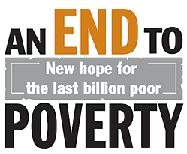
from the March 14, 2008 edition
Practical steps to end poverty
Provided we have the will, where would we begin? How can you help?
By Mark Lange
San Francisco - In this series, we've unpacked popular myths about extreme poverty. We've looked at how we've gotten stuck. We've laid out some key levers for change. And we've considered the consequences of success. The developed world, well-motivated governments, and civil society among the last billion poor clearly have the means to eliminate extreme poverty in one lifetime.
San Francisco - In this series, we've unpacked popular myths about extreme poverty. We've looked at how we've gotten stuck. We've laid out some key levers for change. And we've considered the consequences of success. The developed world, well-motivated governments, and civil society among the last billion poor clearly have the means to eliminate extreme poverty in one lifetime.
So, provided we have the will, where would we begin?
We'd start by focusing rich-world financial and technical resources on the worst-off. Today wealthy nations and institutions sprinkle too little public money in too many countries like magic dust. Devoting disproportionate aid funding to countries that don't desperately need it is an ethical failure that should be turned on its head.
We'd make aid transfers to lawless regimes only after specific political, military, and humanitarian milestones were met, not based on promises too often broken. To get more aid directly into the hands of people under the worst governance, we'd spend less on general budget support, more on specific project funding, and far more on individual vouchers redeemable at local markets, aid agencies, and NGOs for food, medicines, visits from health workers, seeds, equipment.
We'd build and integrate better online professional clearinghouses for projects, effective practices, technical experts, and people at work in these nations, such as the Global Development Commons launched by Henrietta Fore at the US Agency for International Development (USAID).
We'd raise our standards on what we measure and manage. Donors, aid agencies, and NGOs would run controlled project trials wherever feasible, and careful statistical analysis where not – funding what works, reworking what doesn't, and amply rewarding people for working across organizations to deliver country-based results.
We'd get over the "scandal" that a quarter of aid is technical assistance, decried because recipient countries don't get cash. Such skills are painfully absent among the last billion, whose educated tend to emigrate. In fact, we'd fund more and better technical assistance – especially in agriculture, property rights, banking, and governance.
The leadership and citizens of African countries, particularly those adjoining landlocked and desperately poor nations, would take bolder steps to diversify their economies, create new markets across borders, cut "protective" tariffs and red tape, clamp down on spurious "fees" that enrich bureaucrats, and implement reforms of their own to avert having terms dictated by wealthy donor nations.
We'd push harder on labor standards by giving the International Labor Organization some real authority to ensure that wealth from business and resource development does more than enrich local elites. A national minimum wage was made law in the US to preempt bottom-fishing in the poorest regions. Given the global nature of markets now, it's time to negotiate an international minimum wage, pegged to purchasing power parity for a basic basket of subsistence goods.

